Solar Installers Candia
Best Solar Installers Near Me in Candia
Receive up to 3 Solar Installer quotes for your project today! Compare profiles, reviews, accreditations, portfolio, etc... and choose the best offer.
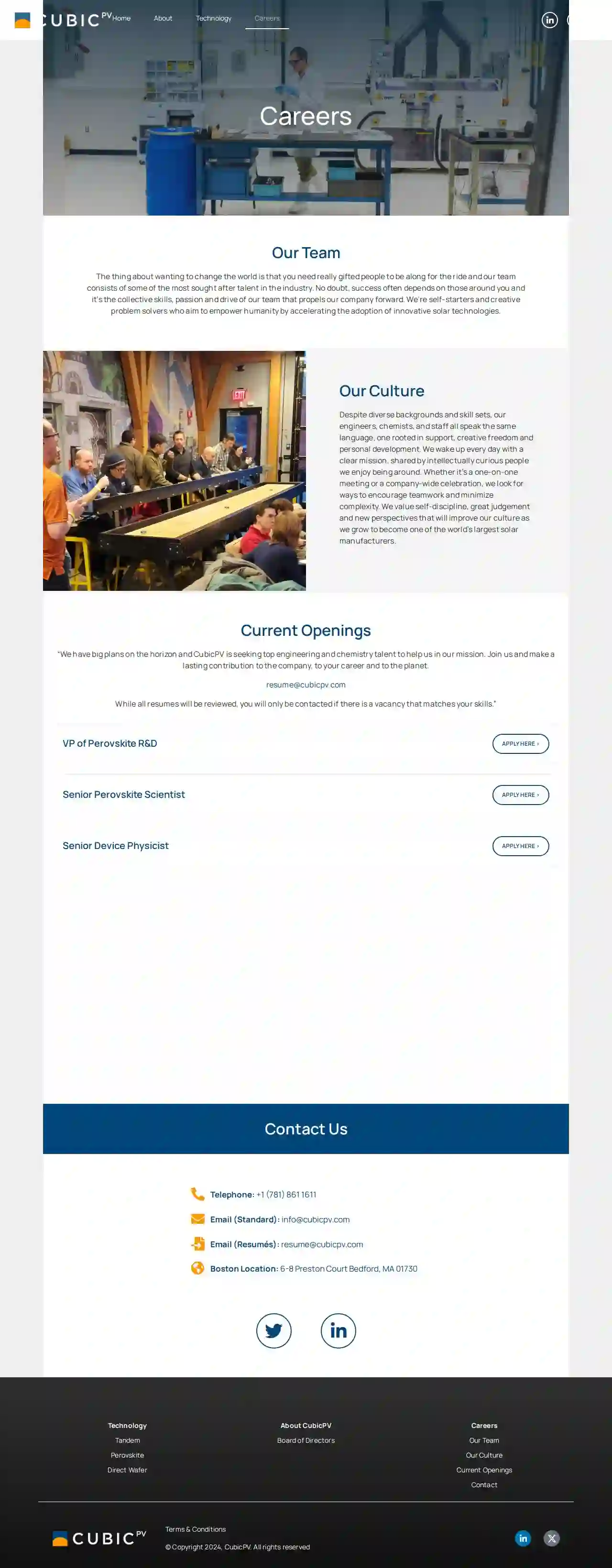
CubicPV
28 Crosby Drive, Unit 2500, Bedford, 01730, USCubicPV is a leading innovator in solar technology, focusing on creating a future defined by more powerful tandem solar modules and dramatic reductions in the cost of electricity. The company has received numerous industry accolades for its technology, including IHS CERAWEEK’s 2019 Energy Pioneer, Fast Company’s 10 Most Innovative Companies in Energy, Bloomberg New Energy Finance’s New Energy Pioneer, PV Magazine’s Technology to Watch, and The World Economic Forum’s Technology Pioneer.
- Services
- Why Us?
- Accreditations
- Our Team
- Testimonials
- Gallery
Get Quote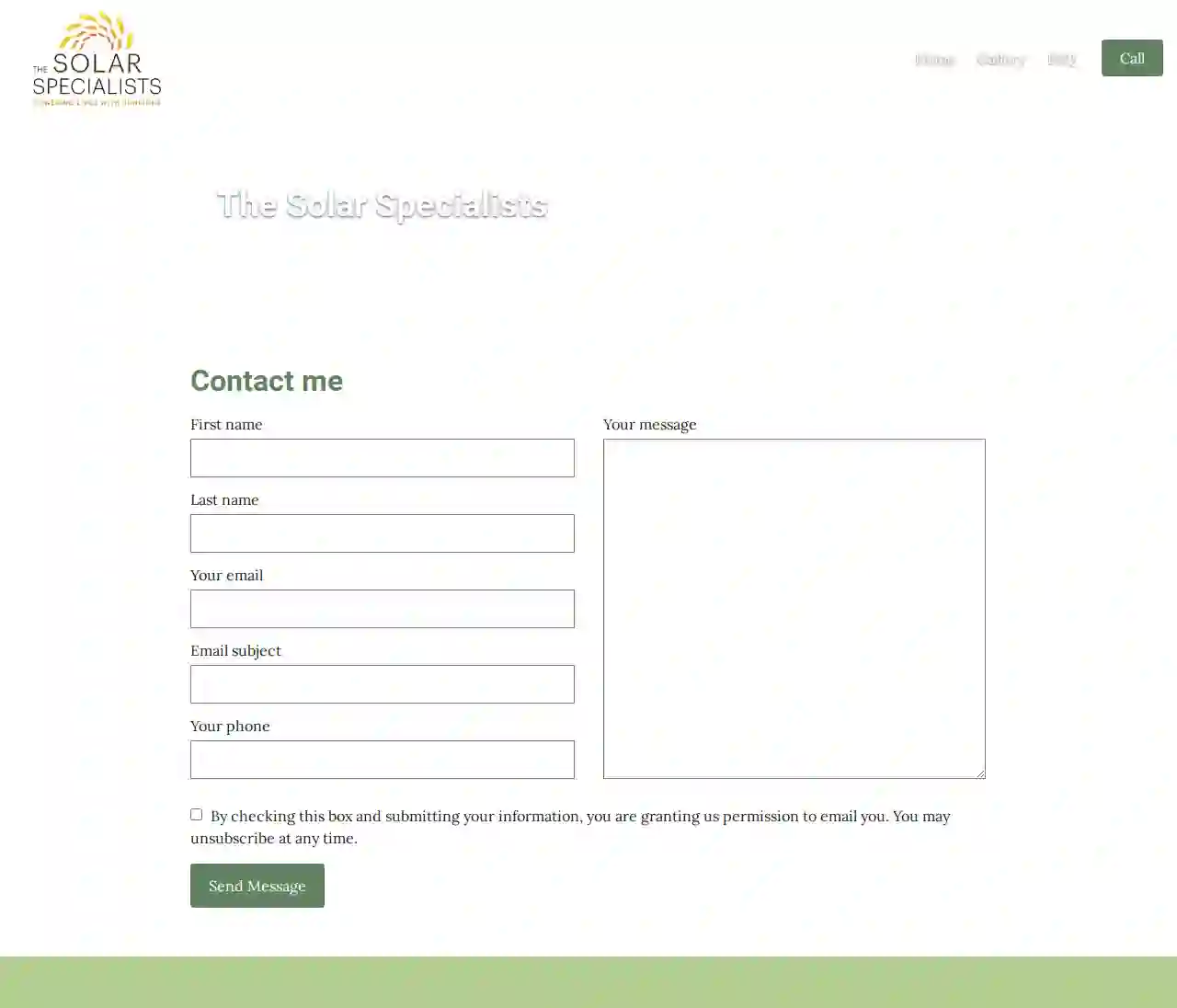
The Solar Specialists
Worcester, VT, 123 Solar Lane, 05676, USThe Solar Specialists, founded by Doug Wells, is a company dedicated to promoting sustainability in the community through the design and installation of renewable energy systems. With a focus on solar energy, they aim to help clients achieve energy independence and create a better future. Their services include design and installation of solar electric systems, site analysis, consulting, and maintenance of older systems. They specialize in battery-based design for both off-grid and grid backup systems.
- Services
- Why Us?
- Accreditations
- Our Team
- Testimonials
- Gallery
Get Quote
Newport Renewables
56 reviewsWakefield, RI, USA, 316 Columbia St, 02879, USNewport Renewables is a leading provider of renewable energy solutions, focusing on custom home builds and commercial and utility solar power. They deliver clean energy solutions using a technology-based approach, yielding a higher degree of accuracy and precision than competitors. Their services include development, construction, operation, and maintenance for renewable energy projects throughout the region.
- Services
- Why Us?
- Accreditations
- Our Team
- Testimonials
- Gallery
Get Quote
Net Meter NH Solar
513 reviews123 Main St, Nashua, 03060, USNet Meter NH is a local business dedicated to providing high-quality services in the field of renewable energy. Our mission is to help homeowners and businesses reduce their energy costs by installing solar panels and other renewable energy solutions. With over 15 years of experience in the industry, we have a team of experts who are fully trained and certified to handle all your renewable energy needs. We are fully accredited and insured, ensuring that our clients receive the best service possible.
- Services
- Why Us?
- Accreditations
- Our Team
- Testimonials
Get Quote
Granite State Solar
4.8162 reviews57 Ryan Road, Bow, NH, 03304, USGranite State Solar is a residential and commercial solar and backup energy solution provider. We make energy projects simple through every step, from the initial site visit and system design, to the project management, permitting and installation, all the way to post-install maintenance. Our team takes an educational and no-pressure sales approach, and always puts our customers first. With our full team based in Bow, NH, our doors are always open!
- Services
- Why Us?
- Accreditations
- Gallery
Get Quote
GoSolar New England
Suite 101, Concord, NH, 123 Solar Way, 03103, USGo Solar NH is a leading provider of solar energy solutions in New Hampshire. Our mission is to help homeowners and businesses reduce their energy costs and carbon footprint by harnessing the power of the sun. With over 15 years of experience in the solar industry, our team of experts is dedicated to delivering high-quality solar installations and exceptional customer service. We are fully accredited and insured, ensuring peace of mind for our clients. Our services include solar panel installation, solar battery storage, and solar panel maintenance.
- Services
- Why Us?
- Accreditations
- Our Team
- Testimonials
Get Quote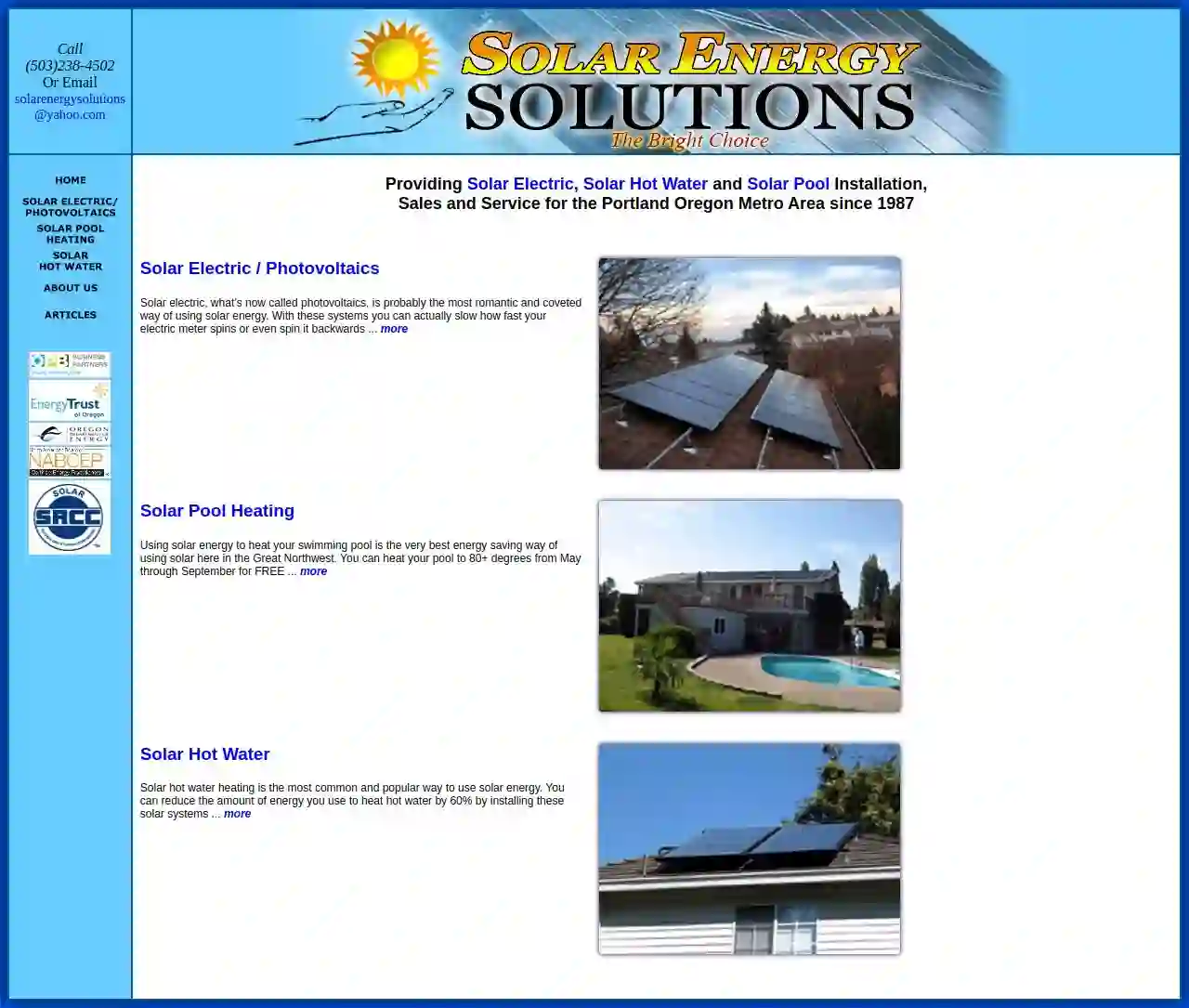
Solar Energy Solutions
4.816 reviews123 Solar Way, Portland, OR, 97201, USSolar Energy Solutions, Inc. is the most persnickety, reliable, and environmentally oriented solar energy company in Portland. The mission of Solar Energy Solutions, Inc. is to move Portland, the Pacific Northwest, and the rest of the world towards an environmentally sustainable future. Our attentive staff accomplishes this through the sales, installation and servicing of all solar and renewable energy systems.
- Services
- Why Us?
- Accreditations
- Our Team
- Testimonials
- Gallery
Get Quote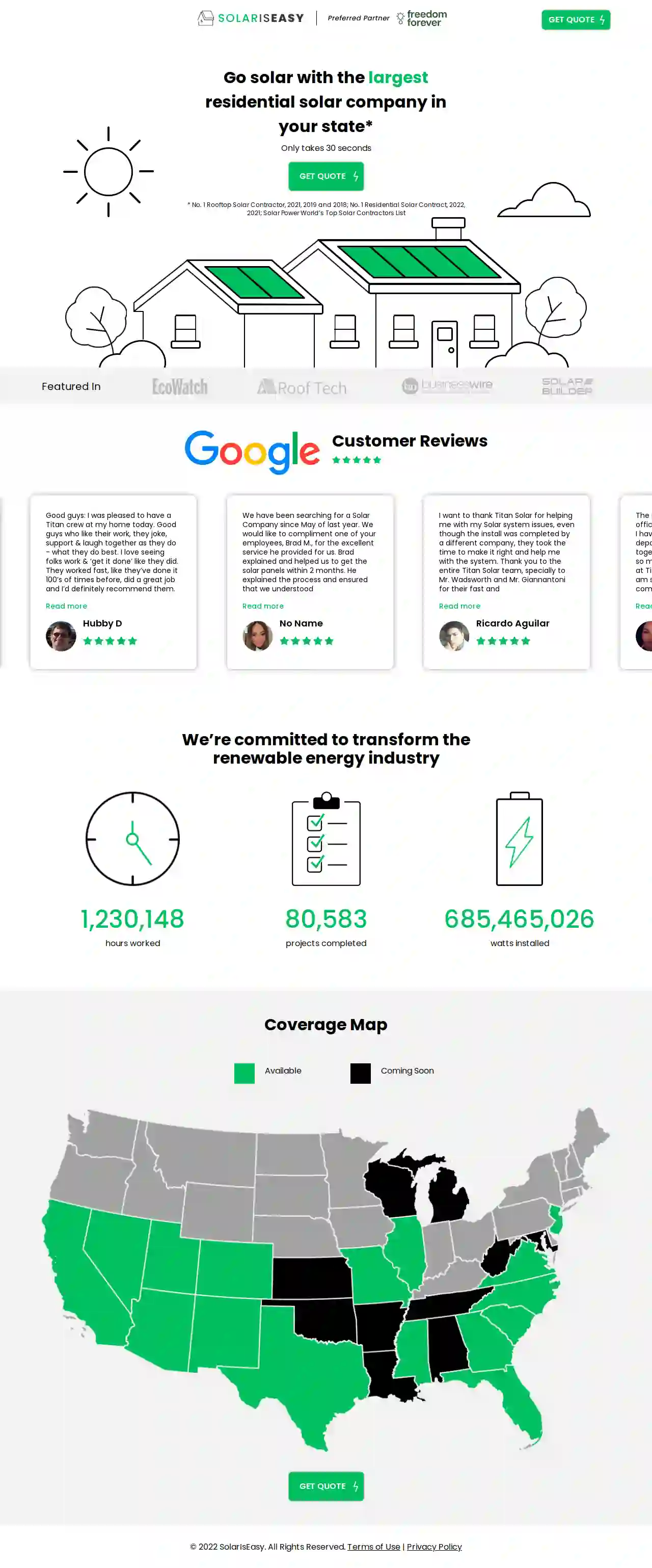
Solar Is Easy - Premier Solar Provider
Boston, USGet quote Go solar with the largest residential solar company in your state* Only takes 30 seconds Get quote * No. 1 Rooftop Solar Contractor, 2021, 2019 and 2018; No. 1 Residential Solar Contract, 2022, 2021; Solar Power World’s Top Solar Contractors List Featured In Customer Reviews We’re committed to transform the renewable energy industry 1,230,148 hours worked 80,583 projects completed 685,465,026 watts installed Coverage Map Available Coming Soon Get quote © 2024 SolarIsEasy. All Rights Reserved. Terms of Use | Privacy Policy
- Services
- Why Us?
- Accreditations
- Testimonials
- Gallery
Get Quote
Same Sun Of Vermont Inc
4.213 reviews141 West Street, Rutland, 05701, USSame Sun of Vermont is a family-owned and operated business established in 2011 by Rutland Town residents Marlene and Philip Allen. The company began as a response to the growing demand for solar energy solutions and has since expanded to provide services including solar installation, EV charger installation, and solar service and repair. Same Sun is dedicated to empowering homeowners and business owners through the creation of their own energy, using American-made products and providing local good-paying jobs.
- Services
- Why Us?
- Our Team
- Gallery
Get Quote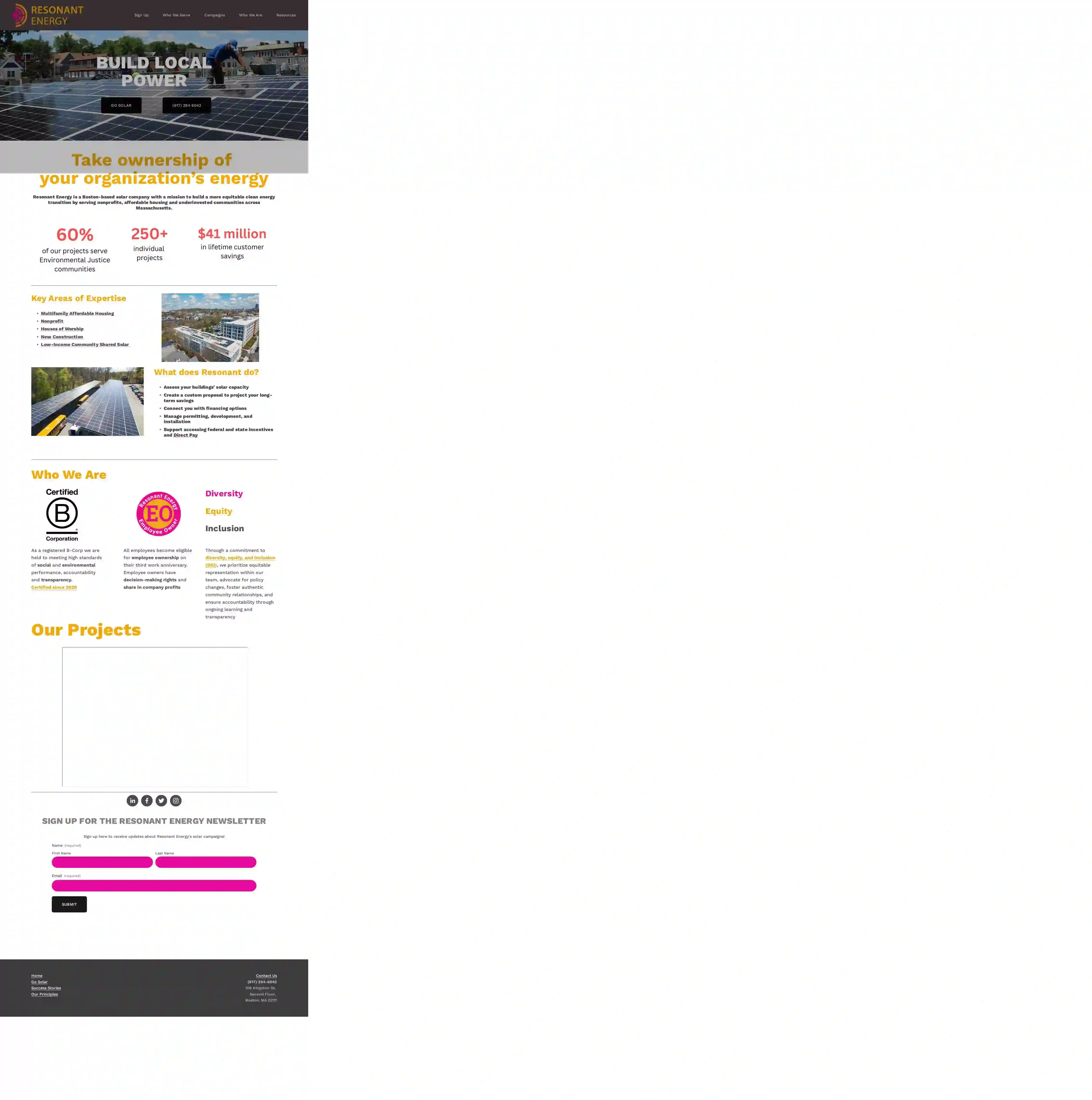
Resonant Energy
510 reviews109 Kingston St, Second Floor, Boston, 02111, USResonant Energy is a Boston-based solar company with a mission to build a more equitable clean energy transition by serving nonprofits, affordable housing, and underinvested communities across Massachusetts. They assess buildings' solar capacity, create custom proposals to project long-term savings, connect clients with financing options, manage permitting, development, and installation, and support accessing federal and state incentives and Direct Pay.
- Services
- Why Us?
- Accreditations
- Our Team
- Gallery
Get Quote
Over 4,210+ Solar Companies registered
Our solar pros operate in Candia and beyond!
SolarCompaniesHub has curated and vetted Top Solar Businesses in and around Candia. Find a top & reliable pro today.
Frequently Asked Questions About Solar Installers
- String Inverters: Connect multiple panels in a series (a 'string'). A cost-effective option for simple systems, but a single panel issue can affect the entire string.
- Microinverters: Attach to each individual solar panel, maximizing energy production even if some panels are shaded. They are more expensive but offer greater efficiency and monitoring capabilities.
- Power Optimizers: Similar to microinverters, but less expensive. They optimize the output of each panel and provide individual panel monitoring, but a central inverter is still required.
- Hybrid Inverters: Combine a solar inverter with a battery charge controller, allowing for seamless integration of battery storage.
- Tax Credits: Reduce your income tax liability based on the cost of your solar system.
- Rebates: Direct cash payments or discounts on the purchase of a solar energy system.
- Net Metering: Allows you to sell excess solar electricity back to the grid for credits.
- Renewable Energy Certificates (RECs): Tradeable credits representing the environmental attributes of your solar energy generation.
- Use a Directory Like SolarCompaniesHub: We connect you with pre-screened, qualified solar installers in your area.
- Check Online Reviews: Look for positive reviews on Google, Yelp, and other reputable sources.
- Ask for Referrals: Get recommendations from friends, family, or neighbors who have gone solar.
- Verify Credentials: Ensure the installer is licensed, insured, and certified by reputable organizations (e.g., NABCEP in the US).
- Get Multiple Quotes: Compare quotes from at least 3-4 installers to find the best value for your project.
- Ask Questions: Don't hesitate to ask installers about their experience, warranties, and the process they follow.
Can I go completely off-grid with solar panels?
What are the different types of solar inverters?
Are there any financial incentives for going solar?
How do I find a good solar installer near me?
Can I go completely off-grid with solar panels?
What are the different types of solar inverters?
- String Inverters: Connect multiple panels in a series (a 'string'). A cost-effective option for simple systems, but a single panel issue can affect the entire string.
- Microinverters: Attach to each individual solar panel, maximizing energy production even if some panels are shaded. They are more expensive but offer greater efficiency and monitoring capabilities.
- Power Optimizers: Similar to microinverters, but less expensive. They optimize the output of each panel and provide individual panel monitoring, but a central inverter is still required.
- Hybrid Inverters: Combine a solar inverter with a battery charge controller, allowing for seamless integration of battery storage.
Are there any financial incentives for going solar?
- Tax Credits: Reduce your income tax liability based on the cost of your solar system.
- Rebates: Direct cash payments or discounts on the purchase of a solar energy system.
- Net Metering: Allows you to sell excess solar electricity back to the grid for credits.
- Renewable Energy Certificates (RECs): Tradeable credits representing the environmental attributes of your solar energy generation.
How do I find a good solar installer near me?
- Use a Directory Like SolarCompaniesHub: We connect you with pre-screened, qualified solar installers in your area.
- Check Online Reviews: Look for positive reviews on Google, Yelp, and other reputable sources.
- Ask for Referrals: Get recommendations from friends, family, or neighbors who have gone solar.
- Verify Credentials: Ensure the installer is licensed, insured, and certified by reputable organizations (e.g., NABCEP in the US).
- Get Multiple Quotes: Compare quotes from at least 3-4 installers to find the best value for your project.
- Ask Questions: Don't hesitate to ask installers about their experience, warranties, and the process they follow.